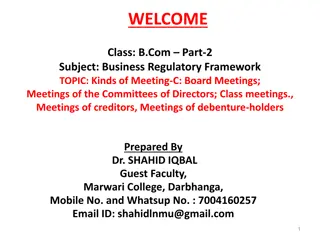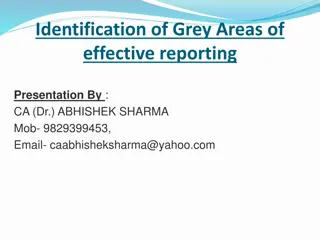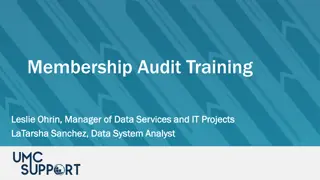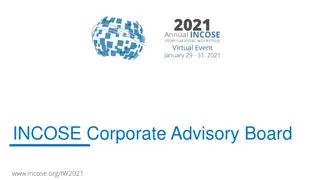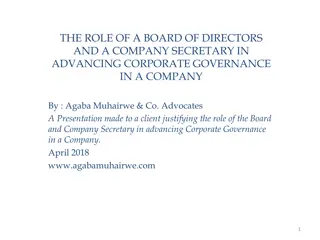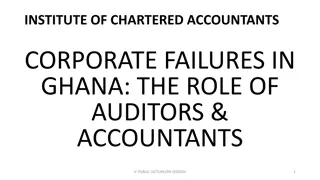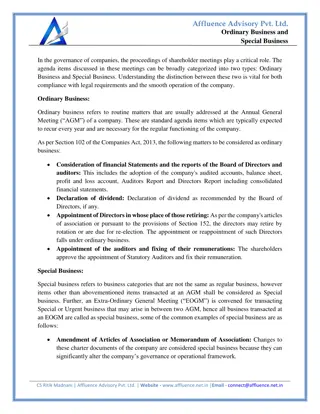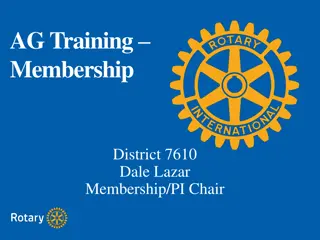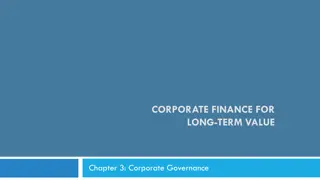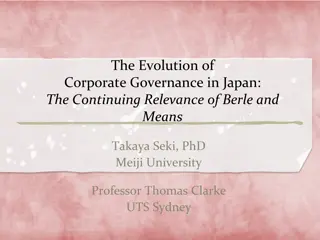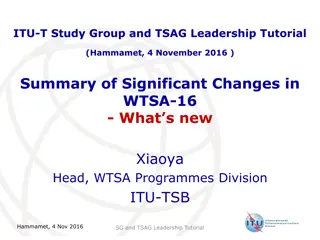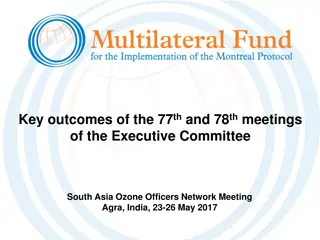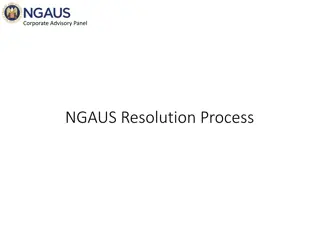Understanding Corporate Governance: Membership, Meetings, and Resolutions
Explore the intricate aspects of corporate governance, focusing on membership acquisition, meeting protocols, and resolution procedures. Learn about the criteria for becoming a member, the types of meetings held, and the processes for making resolutions. Delve into the significance of allotment and transfer of shares in ensuring effective corporate governance practices.
Download Presentation

Please find below an Image/Link to download the presentation.
The content on the website is provided AS IS for your information and personal use only. It may not be sold, licensed, or shared on other websites without obtaining consent from the author. Download presentation by click this link. If you encounter any issues during the download, it is possible that the publisher has removed the file from their server.
E N D
Presentation Transcript
SCOPE OF CORPORATE GOVERNANCE III MEMBERSHIP MEETINGS RESOLUTIONS
SCOPE 1: MEMBERSHIP OF A COMPANY A member is a person who has subscribed the memorandum of a company or any person who has agreed in writing to become a member of a company and whose name is entered in the register of members. Section 79 (1) (2) CAMA
1. Subscriber to memorandum A subscriber to the memorandum becomes a member on the incorporation of the company. They are deemed to have taken the shares set opposite their names.
Other Members Every person other than subscribers must meet two conditions to become a member of a company A. An agreement in writing to become a member: and B. Entry of his name in the register of members.
HOW TO ACQUIRE MEMBERSHIP 1. Subscription: only available to the first subscribers, promoters 2. Allotment & being placed on the register of members 3. Transfer of shares from existing shareholders and being placed on the register of members 4. By Transmission i.e by succeeding to the estate of deceased/bankrupt member, and being placed on the register of members.
ALLOTMENT and TRANSFER of shares. ALLOTMENT is the application for shares in a company by desirous members of the public. The company where it accepts the offer, will allot shares to that person. Within 42 days of allotment, the company writes a letter of Allotment to the applicant notifying him of the allotment and the number of shares allotted to him SECTION 125 (1) CAMA The company shall within 2 months after allotment, issue a certificate of Allotment to the allotee .Section 146 (1)
TRANSFER OF SHARES is the assignment of sale of shares held in a company by the holders of the shares called Transferor or to another person with whom agreement has been reached known as the Transferee For a gift or upon consideration Upon the transfer, steps are taken to register the transfer with the company so that the name of the transfer is substituted with the name of the transferee. Se 152
It is possible to transfer only part of the shares held by a member and the member would still retain the share certificate where all the shares belonging to a member are transferred, a new share certificate shall be issued to the transferee within 3 months
Rectification of the Register of members Se 90 CAMA The Transferee should first notify the company that he is the holder of the shares in question. Where the company does not respond to this notification, the Transferee may apply to the court for rectification of the Register of members. Which Court? By Motion
TRANSMISSION OF SHARES occurs where the shares of a deceased shareholder or shareholder who is bankrupt devolves or transmits to the successors in title or his personal representatives. Se 155 Automatic & Operation of Law
Capacity as to Membership COMPANIES :A company may take shares and be a member of another company and be attending the meetings of the other company by a representative authorised by resolution of its BOD. Sec 231 A company in liquidation is not capable of becoming a member of a company. S 20 (3) ALIENS An alien may join in forming a company or acquire shares in a company but must comply with the laws relating to alien participation. Enemy Alien & Infant.
INCIDENTS /RIGHTS OF MEMBERSHIP Right to dividends ( Debts due & recoverable) Right to bonus shares if declared (shares at premium) Right to attend meetings. Longe v 1STBANK Right to receive notice of meetings Right to vote at meetings and be voted for Right to demand poll Right to appoint proxy Right to requisition Extra-ordinary general meeting
Right to own shares Right to transfer shares Right to sell, mortgage or otherwise dispose of shares Return of capital on reduction of capital/winding up if there is surplus Right to object to alteration of objects clause, shares etc Right to take up minority action Right to petition for investigation by CAC, SEC
Right to petition for winding up Right to copies of memo and articles Right to financial Reports Right to inspect minutes of meetings Right to remain a member unless restructured out and shares acquired.
Current trends in Codes of Corporate Governance Not more than 5% shares in the Banking Sector
CESSATION OF MEMBERSHIP TRANSFER FORFEITURE OF SHARES RIGHT AND EXERCISE OF LIEN BY COMPANY
MEETINGS Types of General meetings of a company 1.Statutory meeting 2.Annual General Meeting (AGM) 3. Extra Ordinary General Meeting (EGM)
STATUTORY MEETING: S 211 Every public company shall, within a period of six months from the date of its incorporation, hold a general meeting of the members of the company to be referred to as the Statutory Meeting PLC ONLY
Facts to Note About Statutory Meeting Solely for Public Companies (PLC) It is compulsory It is to hold within 6 months of the date of incorporation of the company It must be held in Nigeria S 216 Notice must be sent to members at least 21 days before the meeting S.217(1)
Business Transacted at Statutory Meeting The members of the company present at the statutory meeting may i. Discuss any matter relating to the formation of the company and commencement of business ii. Consider the statutory Report iii. Consider matters arising from the statutory report
SECTION 211 (8) STATUTORY REPORT The directors shall, at least 21 days before the day on which the statutory meeting is held forward to every member of the company statutory report. S.211 (2) The statutory report shall be certified by not less than two directors or by a directors and the secretary of the company S.211(3) The directors shall also deliver a copy of the statutory report so certified, to the CAC S 211(6)
Contents of Statutory Report 1.The total number of shares allotted, either as fully paid up, party paid up or partly paid up otherwise than in cash; for shares partly paid up the extent to which they are so paid up, or the consideration for which they have been allotted. 2. The total amount of cash received by the company in respect of all the shares allotted, distinguished as aforesaid. 3. The names, address and descriptions of the directors, auditors, managers, if any, and secretary of the company.
4. The particulars of any pro-incorporation contract together with the particulars of any modification or proposed modification 5. Any underwriting contract that has not been carried out and the reasons therefore 6. The arrears, if any due on calls from every director
7. The particulars of any commission or brokerage paid or to be paid on the issue or sale of shares or debentures to a director or manager S.211(3) 8. An abstract of the receipts of the company and of the payments made form them up to date. S.211(4) 9. The statutory Report as it relates to shares and capital account (receipts & payment shall be certified by the auditors S.211
Resolution on Statutory Report By S. 211(9) CAMA, if a member wishes to propose a Resolution on any matter arising out of the statutory report, from the date of his receipt of the statutory report, he must give a further 21 days notice to the company, of his intention to propose such a resolution in the general meeting.
Penalty on Failure to hold statutory meeting /deliver statutory Report Non-compliance and penalty on Failure to hold statutory meeting or deliver statutory Report would result to 1. The company and any officer in default shall be guilty of an offence and liable to a fine. Section 212 2. Winding up of the company by the court S.408 (b) CAMA (Discretion of Judge)
ANNUAL GENERAL MEETING Section 213 Every company shall in each year hold a general meeting as its annual general meeting a addition to any other meeting in that year and shall specify the meeting as such in the notice calling it and not more than 15 months shall elapse between the date of one AGM of a company and that of the next.
Essential features of AGM It is compulsory for all companies A company should hold its first AGM within 18 months of incorporation Not more than 15 months may elapse between the date of one AGM and the next but so long as a company holds its first AGM within 18 months of its incorporation, it need not hold it in that years or in the following year S.213(1)(a)
Apart from the first AGM, CAC can extend the time of holding any subsequent AGM by not more than 3 months S.213(1) (b) The AGM must be held in Nigeria S 216 Notice must be sent to members at least 21 days before the meeting but shorter notice is allowed if agreed to by all the members entitled to attend and vote S.217(2) (a)
Procedure/Power of CAC to compel BOD to Hold AGM i. A member can apply to the CAC urging the CAC to call or director calling of a meeting. ii. If a member s application is timely and the CAC grants the order to hold the meeting in that year, the meeting is an AGM of that same year. However, where a meeting so held is not held in the year in which the default in holding the AGM occurred, the meeting is not to be treated as the company s AGM of the previous year in which it is held, unless at that meeting the company resolves that it shall be so treated S.213(3)
iii. The CAC can also give a direction that one member of the company present in person or by proxy may apply to the Federal High Court for an order to take a decision which shall bind all the members S.213(2
PENALTY FOR NON-COMPLIANCE The company and every officer who is in default shall be guilty of an offence and be liable to a fine S.213(5)
Business Transacted at Annual General Meeting Two types of businesses are transacted at the AGM of a company A. Ordinary Business B. Special Business.
ORDINARY BUSINESS OF AGM i. Declaration of dividend ii. Presentation of the Financial Statement the Report of Directors and Auditors iii. Election of directors in place of those retiring iv. Appointment of Auditors v. Fixing of remuneration of the auditors vi. Appointment of members of the Audit committee
B. SPECIAL BUSINESS OF AGM Any other business not listed as ordinary business of AGM is deemed special business of AGM SECTION 214
EXAMPLES OF SPECIAL BUSINESS a) To alter the object/ memart b) Change of Name c) Re registration of all types d) Reduction of capital e) Removal of auditor before expiration of tenure f) etc
EXTRA-ORDINARY GENERAL MEETING Section 215 Extra-ordinary General Meeting (EGM) is the General meeting held at any time to transact business that cannot comfortably wait for the next Annual General Meeting (AGM).
TIME AND PLACE FOR EGM An EGM can hold at any time and Need not hold in Nigeria S.216 As many as possible and desirable
WHO CAN CONVENE AN EGM? i. Board of Directors ii. Any Director if other Directors are not within Nigeria & quorum may not be formed for BOD iii. Requisition by members holding not less than one tenth of the paid up share capital of the company, carrying the right of voting
IN CASE OF LIMITED BY GURANTEE? or in the case of a company without a share capital, members holding one-tenth of the total Voting rights of all the member.
PROCEDURE FOR MEMBERS REQUISITIONED EGM The Requisitionists qualified as described in (iii) above must deposit assigned requisition at the registered office of company, stating the object of the meeting : the Resolution which they intend to propose. S. 215(3)
Where Directors Fail to Convene? If the directors do not within 21 days from the date of the deposition of the requisition proceed duly to convene a meeting, the requsitionists, or any one or more of then, representing more than of the total voting rights of all of them, may themselves convene a meeting. Section 215 (4)
Expenses incurred by Requisitionist Any reasonable expenses of the requisitionist in convening the meeting shall be repaid to the requisitionist by the company Section 215(6)
Absence of Quorum at a requisited Meeting? If no quorum is present at the requisitioned meeting, within one hour from the time appointed for the meeting, it is dissolved. i.e. that would be the end of the matter, there is no adjournment. Section 239 (3) AMG
Business Transacted at Extra-ordinary General Meeting By section 215 (8) CAMA, businesses transacted at an extra-ordinary general meeting shall be deemed Special Business . Therefore, a matter which constitutes ordinary cannot be discussed at EGM. Query: Removal & appointment of a director in EGM.? Removal is possible, leading to casual director
COURT ORDERED MEETING Section 223 The Federal High Court can upon an Application, by interested party, order a company s meeting in the following circumstance. If for any reason it is impracticable to call a meeting of a company or for the Board of directors in any manner prescribed by the Articles or CAMA .
ORDERS COURT MAY MAKE Upon the application of any director of the company or of any member of the company who would be entitled to vote at the meeting the court can make all or any of the following orders. A. That the meeting be called, held and conducted in any manner it thinks
B. Give such ancillary or consequential directions as it thinks expedient including a direction that one member of the company present in person or by proxy may apply to the court for an order to take a decision which shall bind all the member S 223(2)
The directions should be confined to matter that will facilitate the meeting and the court should not pronounce on matters reserved for the meeting.




